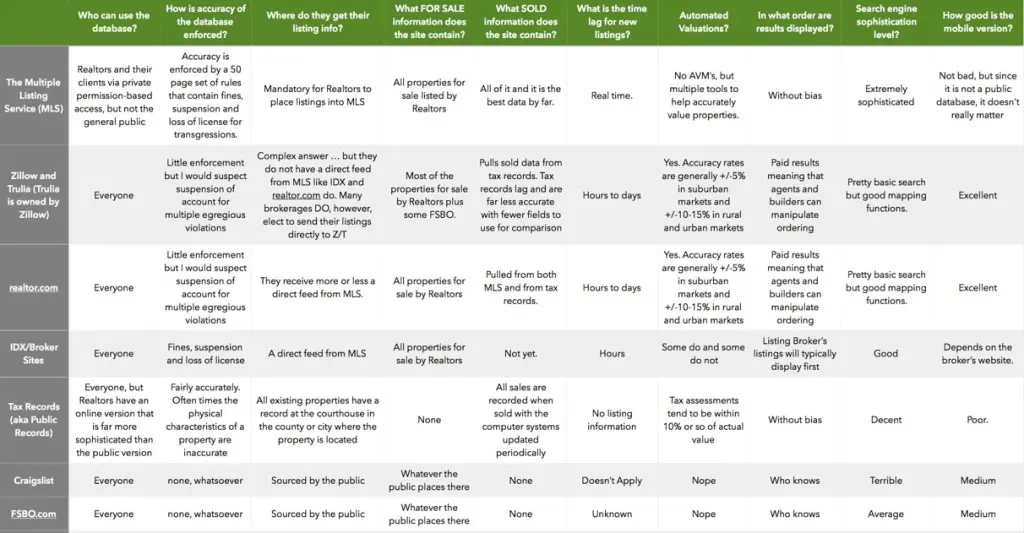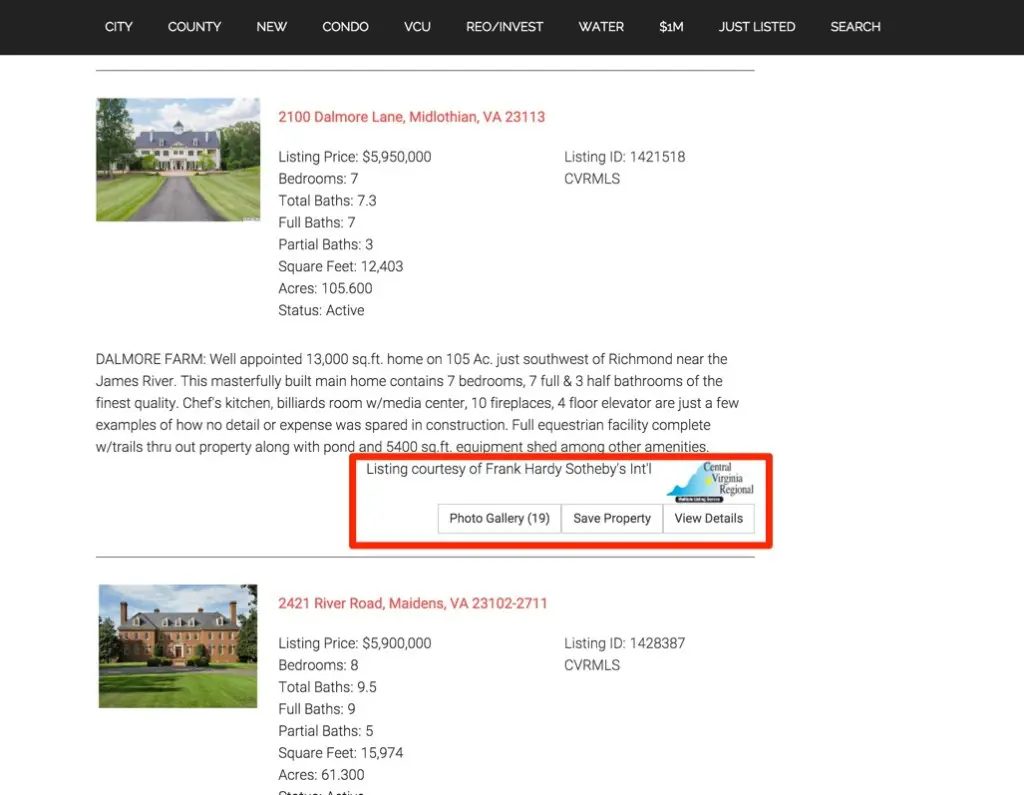This post is dedicated to helping the public learn the ins and outs of searching the Homes For Sale in Richmond VA.
The Confusing World of Online Home Search
It used to be simpler.
In the old days (pre-internet) all one had to do was call a real estate agent and get the most up to date list of properties for sale. Yes, you had to put up with the Realtor sales pitch and yes, sometimes the home you wanted to see was already under contract, but by and large, there was one source of properties for sale — and it was MLS.
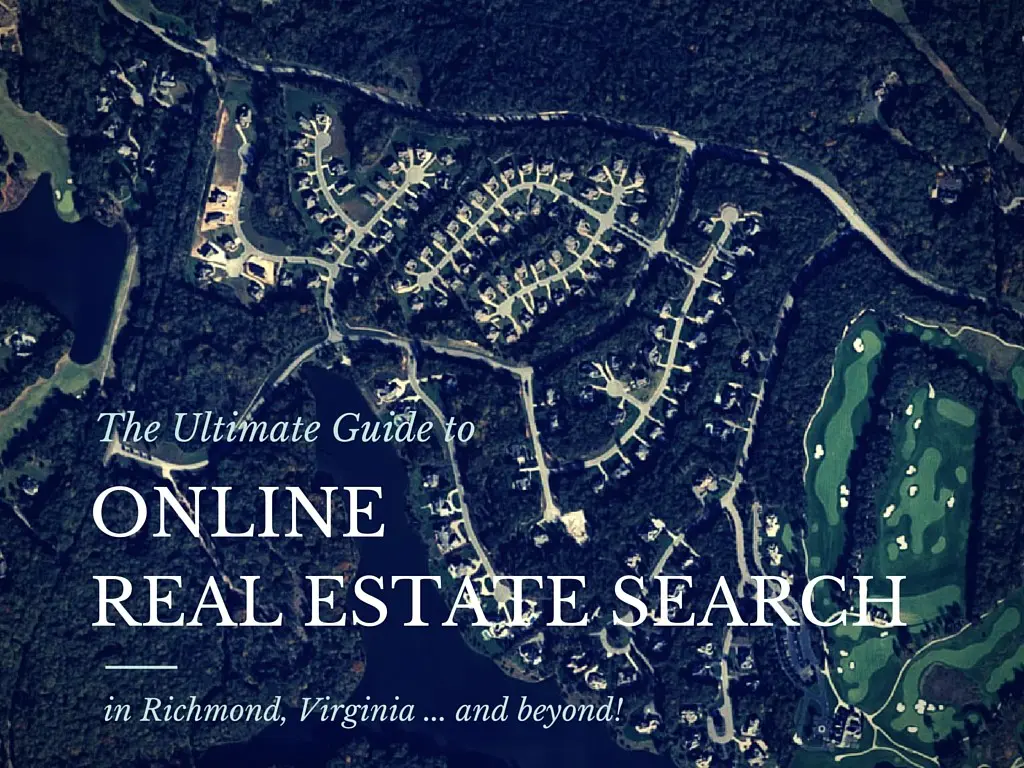
Needless to say, it has changed in the past 20 years.
If you fast forward to today, you will find information on homes for sale pretty much everywhere online. Zillow, Trulia, Realtor.com, Homes.com, Yahoo, AOL Real Estate, Craigslist, Richmond.com … they all have real estate search capabilities and do their best to suck you in, get you to linger while looking for houses and sell advertising space. You name a site and I will show you how you will likely be able to make one click and start your search.

The game of search has changed dramatically and it is not necessarily just for the better. With so many choices comes confusion and the pure volume of search (and the accompanying bragging about who’s site does it best) means the consumer often times does not really understand the subtle, but important, difference in what they are seeing.
Most sites claim that they have the best search … but we are not going to do that here. Rather, we will break down all of the search options and discuss their relative strengths and weaknesses so that you will understand the tools at your disposal and how to best leverage them into a successful outcome.
Along the way, we will add some insight into some best practices so that you will soon be searching like a pro.
Know your databases
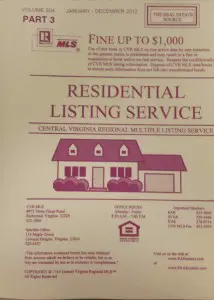
In the old days, there was one database – MLS (the Multiple Listing Service) – and it was closed to the public. Realtors took listings, entered them into the system and then tracked the status during the sales process — from ACTIVE to PENDING to SOLD. Agents acted as curators and doled out the ‘proprietary’ information in a piecemeal manner, mostly to justify our own existence and to remain integral to the process.
Since the public did not have access to this wonderful data and relied on agents to provide them with lists of homes for sale that met their criteria, they were forced early on to inject a Realtor into the sales process, which was precisely the goal. Agents needed to only keep the information protected to ensure a decent living and as long as we controlled the access, we would be fine.
The arrival of Zillow and Trulia on the scene changed it all.
The ‘closed database era’ feels about as long ago as car phones, pagers and MLS books (anyone remember those?) MLS still matters for sure, but not in the same way it used to (more on that in a minute) as any inquiry in the Google bar for ‘ Richmond VA Homes For Sale’ will give you literally millions of results instantaneously.
Database Classification
Any discussion of online search needs to begin with some definitions. Terms like ‘MLS’ and ‘Portal’ get tossed around without the public fully understanding their meanings, and make no mistake, there are differences.
Databases of homes for sale tend to fall in several categories:
- MLS
- Portals (sometimes called Aggregators)
- Brokerage Site Search/IDX
- Public Records
- Message Boards
As one would expect, each type of database serves a different purpose and occupies a slightly different space in the search world. Knowing when (and how) to use each will lead to far better outcomes. If you fail to understand what each does well OR you try to ask one to serve a purpose it is not really designed to serve, then you are going to be disappointed with the performance.
Below is a chart comparing each option (click to enlarge):
The Multiple Listing Service (MLS)
The MLS is the most accurate database, period.
MLS is owned, populated and curated by Realtors. It tracks homes for sale AND sold (and all statuses in between) as well as states the cooperative compensation from broker to broker (think – commissions.) And most importantly, the integrity of the database is enforced with fines, suspensions and potential loss of access for any one of a laundry list of seemingly minor transgressions.
MLS is the only database that has any professional penalty for abuse and thus, it has the best data. Its accuracy makes it the most sought after of all databases as the information contained within is the most current, most in-depth and has the most integrity.
Portals/Aggregators
Zillow, Trulia, Homes.com and Realtor.com are considered ‘portals’ and/or ‘aggregators.’
These sites take listing information (as best they can get it) and combine it (or ‘aggregate’ it) with other information (tax records, most notably) to give the public a site where they can a great deal of information on available homes as well as sold ones. Zillow’s value estimates are also a popular feature and many feel that these estimates of value are extremely important.
The majority of the portals want the public to believe that they are MLS (or have access to all of its data) which is not true. This is an incredibly important distinction as being even hours late to the party can cause you to miss out or cause you to end up in a bidding war.
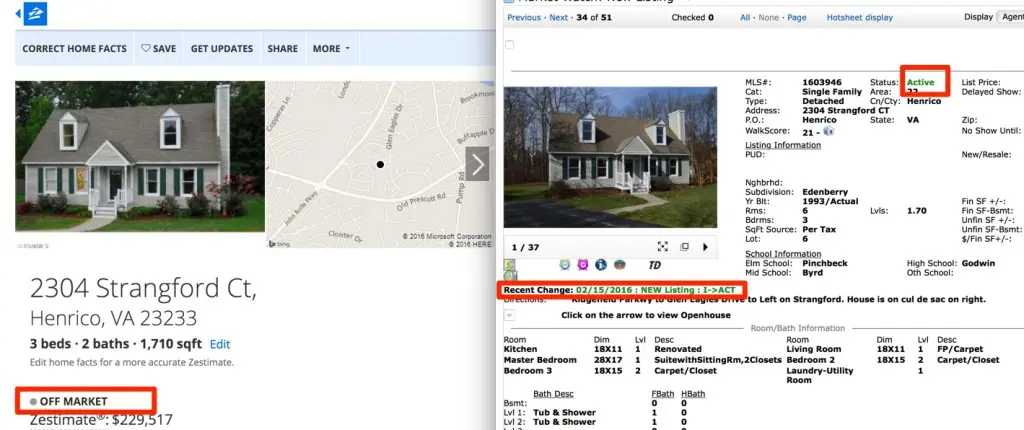
We talk in more detail about which search source a buyer should be using and when they should be using it in a later section. And we will also discuss the controversial ‘estimates of value.’
Portal Advertising
Web traffic means money and every business exists to make a profit – Trulia and Zillow are no different. From the beginning, these sites have served as an advertising medium for agents who purchase space on the sites to try to attract buyers.
This advertisement space they sell is their primary source of revenue — and they sell EVERYTHING. As an agent, I can pay to be a featured agent, or to have properties featured, or to have other agents blocked off of my listings, or to be featured on desktop computer, or on a mobile device, or to be featured to buyers OR sellers and just about everything else you can imagine.
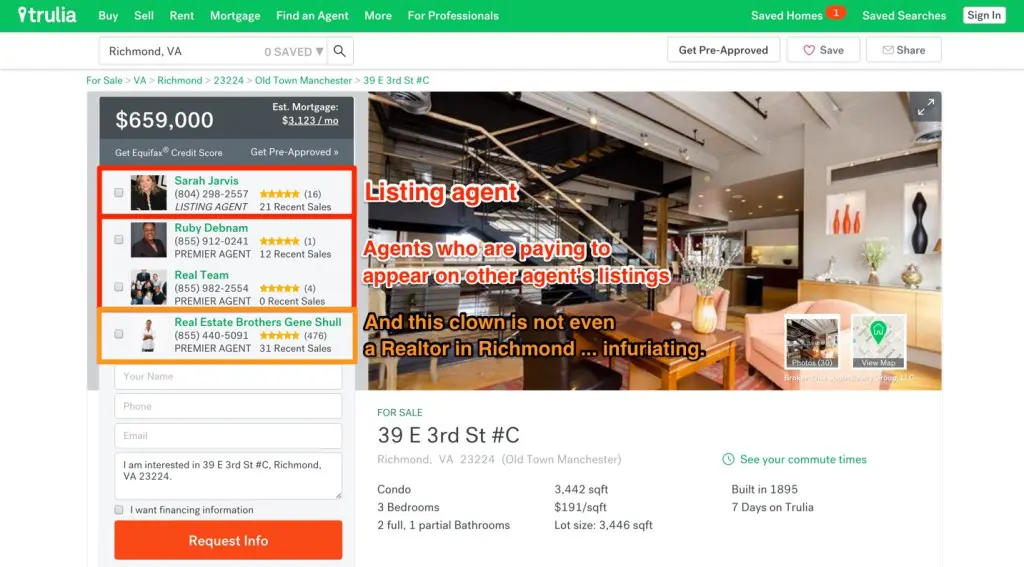
Now, as with any form of advertising, accuracy is in the eye of the beholder and for a relatively paltry amount, I can buy space on these sites to try to craft an image that may or may not be true. As an agent, I am allowed, for anywhere ranging from $100 to maybe $1500 per month, to buy ‘impressions’ in zip codes that I may or may not have any experience in … and I am not bound by it being in the came city.
So be warned that the agents promote themselves on these sites are not confined by anything resembling the truth and the portals have shown little to no interest in trying to enforce a user experience that resembles reality, either.
It is sad.
Brokerage Site Search/IDX
Several years ago, about the time that the web began to really be used to display listings, the brokerage community got together and with unusual foresight, established rules on how to share listing data. We called the set of rules ‘IDX’ or ‘Internet Data eXchange’ protocol and by participating, brokerages agree to share their listing data with one another for the collective good of all involved.

Effectively, IDX allows Brokerage A to show Brokerage B’s listings on its site – provide it credits Brokerage B as the listing broker. See the screenshot below – the listing appears on the One South Realty website, but we credit Frank Hardy as the listing brokerage, according to IDX rules.
So if you see the listing brokerage referenced somewhere near the bottom of the page, despite being on a different brokerage’s website, you are more than likely looking at an IDX feed coming straight from MLS.
So What Does IDX Do Well?
Well, accuracy and timeliness, to name two things … and no advertisements, to name a third.
The IDX data feed is one of the few data feeds that comes directly from MLS and thus the delay between a property entering MLS and subsequently finding its way into the IDX display is measured in hours (and sometimes in minutes,) not days. So if you want to know what is for sale and you want to know it now — but still don’t want to involve a Realtor (which is totally understandable) — then I would seriously consider using an IDX-based site for my search.
And in addition to timely information, brokerage websites can be incredible resource for buyers, as many times they offer awesome intel on neighborhoods and trends. So consider using brokerage website as a part of your research.
Public Records/Tax Records/Property Records
Depending on where you are from, you may hear these terms used interchangeably, but they all refer to the records at the courthouse that describe each and every parcel that legally exists within the municipal’s borders. Along with a basic description of the property, the ownership is listed as is an estimated value of both the land and the improvements on the property that the city/county uses to establish the taxable value. The values typically run anywhere from about 90% to 97% of what eventually will turn out to be Fair Market Value … provided the public record is accurate.
Now, as agents, we have access to tax record data online and with a far more sophisticated and reliable search engine than the municipals offer to the general public. Our ability to execute some pretty amazing searches within tax is far easier for an agent inside of MLS than the public using the City of Richmond (or Chesterfield, Henrico, etc.) site.
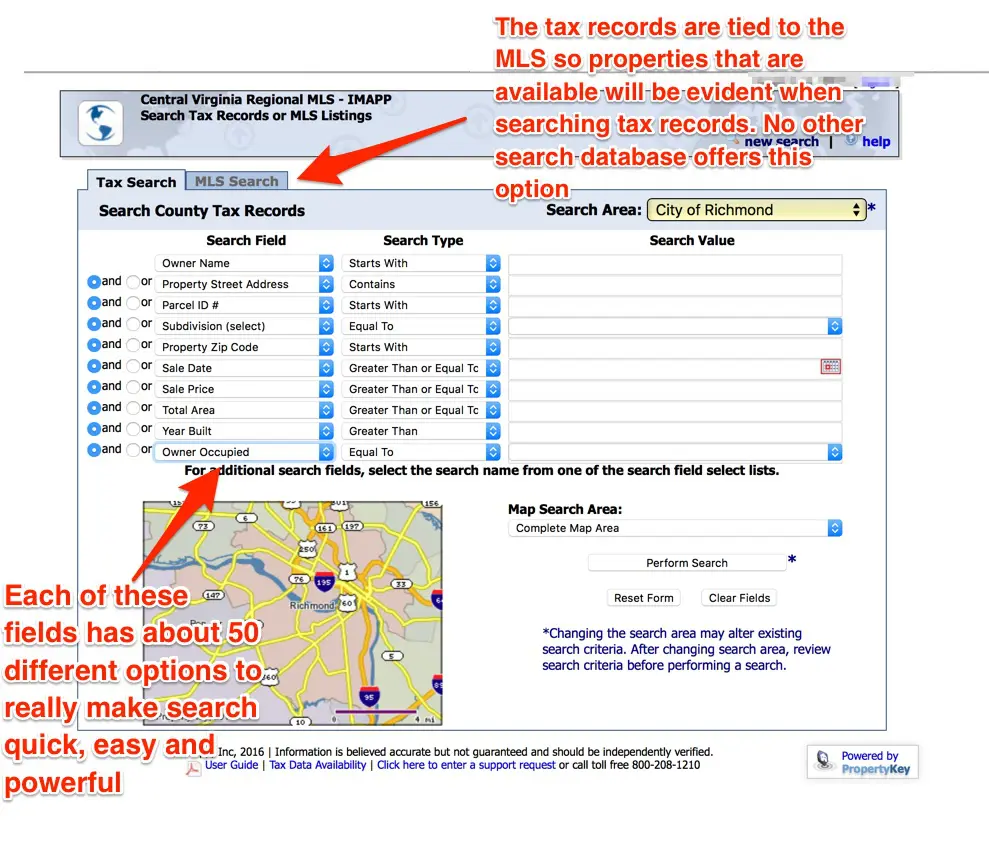
What Does Searching the Tax Records Offer?
In many cases, developers, renovators or other shrewd value investors use the tax records to identify properties that may not be on the market. This is especially true in the commercial or multi-family market.
As an example, some interesting searches that agents can execute in tax records to identify properties are:
- Search based on absentee owners
- Search for abnormal lot sizes
- Search for ‘lot to improvement ratios’ that are out of skew
- Search for vacant property
- Search for specific zoning
- Search by owner mailing address
But here are the public version of the sites — most offer some blend of GIS and parcel mapping. Overall, if you are searching for suitable properties for development or other improvement opportunities, you will find the municipal search engines pretty crude:
Message Boards
Craigslist and ForSaleByOwner.com are the two most common. These are sites where you can sometimes find available properties that may or may not actually be available. As with any message board that is not curated or really monitored, information is sketchy and scams commonplace.
If you want to check these sites, have at it, but the likelihood of finding any value is slim.
Which Source Should You Use?

So which database should you use for your search? Well, it depends on how serious your search actually is.
Much in the same way the WebMD or LegalZoom can offer you some basic info on injury and illness or can a provide template for a basic LLC or a simple will, public facing portals (like Trulia and Zillow) offer very usable real estate information and don’t require a Realtor to provide it to you.
As an example, I might go to WebMD for treatment suggestions for a sprained ankle or a sore back after a workout, but if I am having debilitating back spasms or my ankle is blue and I can’t put weight on it, a trip to the doctor is probably in order.
To put it in real estate search terms – if you don’t really care about immediacy AND you don’t really care if you are seeing ALL of the available properties AND if being +10% in your estimate of value is sufficient, then a portal is a perfectly good source of information. Sometimes a cursory level of information is perfectly fine and maintaining anonymity is strongly preferred. In full candor, I often use Zillow or Trulia as basic fact checking or for global comparisons. If you need general info, then use the portals.
However, if you are expecting to find the perfect home in the sought after neighborhood and want to know about it the second it comes on the market, you might want to look to more reliable sources.
So knowing what each database does well will tell you which one to use and when … and here are the common scenarios:
‘We are just getting started …’
For those just getting started and a general feel for the market is required, then the level of accuracy provided by Trulia or Zillow is probably fine. Similarly, if you just need to get a feel for values in one area of a city versus another or to decide whether to take the new job in Tacoma, Washington, then Zillow or Trulia are great.
That said, don’t ignore sites such as the one you are on (RichmndVAMLS.net) or other IDX-based brokerage websites. Many times, the local sites offer some great intel on neighborhoods and development trends (at least they should.) On good sites maintained by experienced agents, they will offer neighborhood narratives that can give you a real sense of what the area is like, and at least to me, this is incredibly valuable information. Zillow and Trulia do have some great high-level statistical tools but often fall short of offering a ‘street-level’ perspective.
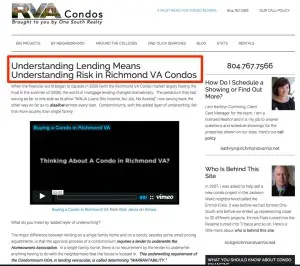
We have created several for our clients that each attack a different aspect of Richmond VA real estate:
- Richmond VA MLS (general search)
- Richmond VA Condos (breaks down the condo market)
- Richmond VA New Homes (breaks down the new home market)
Remember, brokerage websites have all of the listings on them that Trulia and Zillow do … if not more. And in addition to offering narratives about the different neighborhoods, many times the blog-based IDX sites will also offer in-depth ‘how-tos’ or other instructions on an unfamiliar asset type or technique. Downsizing to a condo, buying a home for the first time or building a new home may be unnerving to an inexperienced buyer and gaining some perspective is often quite helpful.
Don’t ignore the brokerage blog sites exclusively for Zillow and Trulia — there is really good info on many of them.
‘We are just looking for Open Houses …’
Trulia and Zillow do a decent job of open houses and have largely replaced the classified ads as the primary source for which houses are open on any given weekend. I am not sure how the newspapers are still in business, but I digress. Here are the places where you can find open house info:
MLS does have a section for open houses but agents don’t update it as often as they should.
‘We have to be in our new home in 60 days!’
Use MLS. Use MLS. Use MLS. Do not use Zillow. Do not use Trulia. I cannot stress this enough.
Look at what has happened to inventory in the past few years:
Inventory conditions are extremely tight and should remain that way for the immediate future — especially in mature or ‘close-in’ neighborhoods where large scale new home development is challenging.
For a myriad of complex reasons that are difficult to fully explain (but are related to data syndication and aggregation,) the time lag or likelihood of a listing coming to the market yet being missed by Zillow or Trulia is too high to risk. I cannot tell you the number of times I hear stories from clients that missed an opportunity to buy a home because they saw it a day or two too late (or not at all) because Zillow or Trulia somehow missed it or received conflicting information from different sources.
Don’t be that person.
Value Research and the AVM
I am willing to go on record stating that I hate the Automated Valuation Models (AVM’s) provided by Zillow (and the other sites.)
Now, I do not hate them for the reason most people think (most feel that Realtors are somehow threatened by a computer algorithm doing our jobs and thus, hate them.) No, I hate them because Zillow publishes them as absolute values and no discussion is given to the confidence at which they are stated.
Stated differently, AVMs’ spew out a singular number, not a range, and do not make any mention of the confidence in the data that they used to arrive at the value.
How Are AVM’s Computed?
The first thing to understand is that the AVM’s draw their data largely from tax records. As any agent will tell you, the tax records are about as accurate as you would expect a government agency to be. On a good day, tax records are ‘somewhat accurate’ and on a bad day, they are just plain wrong so to base any value on their data is suspect from the outset.

Over time, renovation levels change, additions are constructed (often times with no knowledge of the county or city,) or unfinished space in the basement or on the 3rd floor is finished into a bedroom or play area … once again, without the knowledge of the city or county. Imagine a home where the kitchen was just renovated and 1500 SF in the basement was recently finished, but the tax records do not reflect the improvements made? When the underlying data is off by 25%, how much impact will it have on the AVM? I would assume that the impact of bad data would be pretty extreme …
Similarly, the ability to compare homogenous homes in suburban areas is far easier than in urban areas or rural areas where property values can vary widely. When you have 20 homes that have sold in the past 12 months that are were built in a similar time period, by the same basic set of builders and on similar sized lots with similar materials, then your values are going to be far more accurate. But when you are trying to compare houses built 50 or more years ago with varying lot sizes, varying renovation levels, varying architecture and with undocumented additions, then you cannot expect the confidence in the valuation to be the same.
Despite the differences, Zillow states its Zestimate in the same terms — whether it is 99% or 29% sure of its valuation — it is insane and in my opinion, the practice is both irresponsible and damaging to those who take these estimates as gospel.
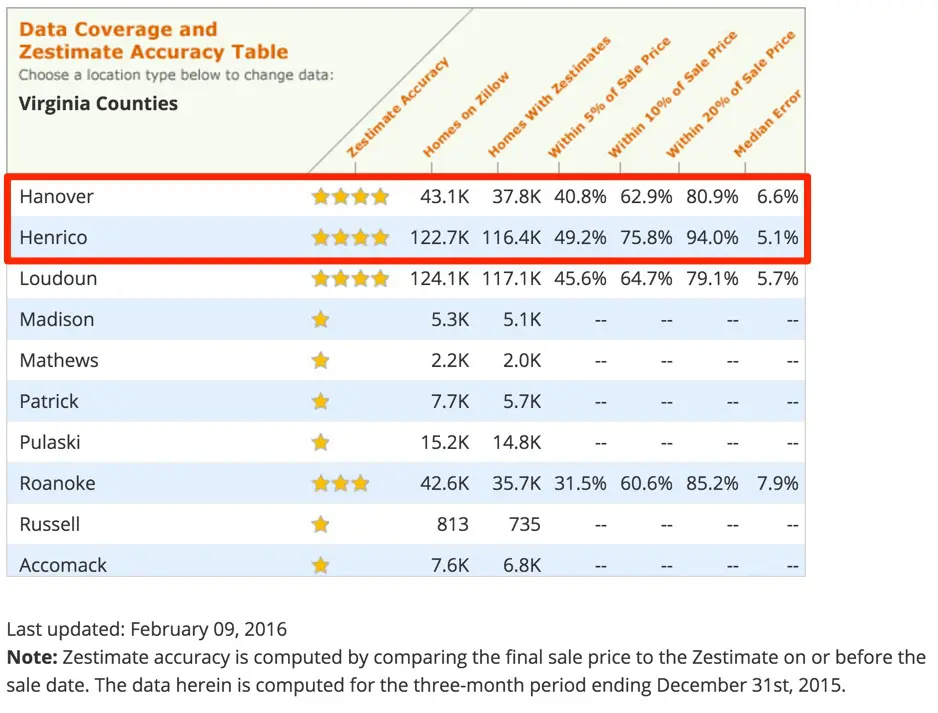
So when I see someone making a decision based on a Zestimate, I cringe. As I have said many times, using a Zestimate IN your analysis is perfectly reasonable but using a Zestimate AS your analysis is a really poor idea.
The New Breed of Estimates
Now, as more sites emerge to try to capture real estate search traffic, more AVM’s are being offered … and despite my declared hatred of the AVM, having more sites take a whack at it is a GOOD thing.
Why? Because each site uses a different valuation method and the estimates of values differ – which vividly demonstrates the fact that valuing property is extremely subjective and that two different algorithms with access to the exact same data can arrive at different conclusions.
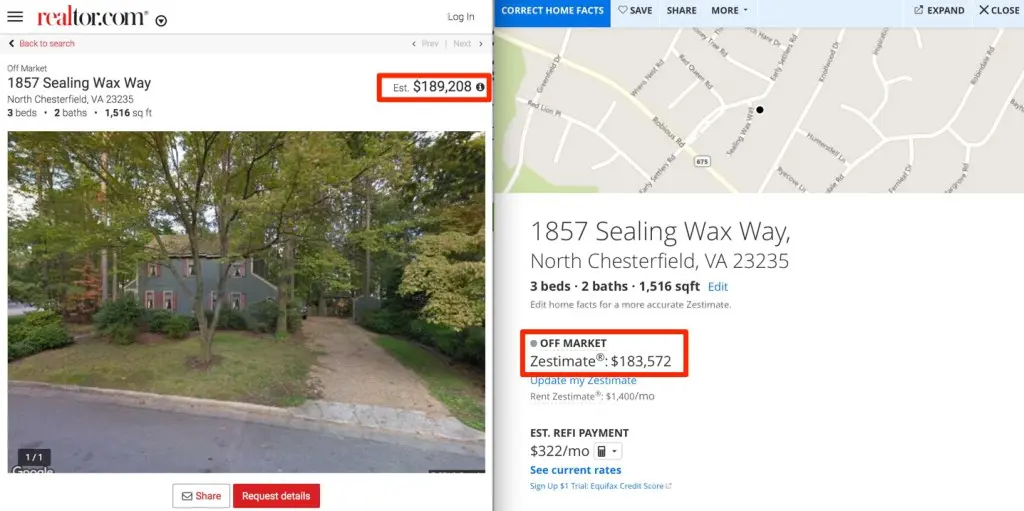
When AVM’s differ, it forces the public to both acknowledge and question the differences in valuation methods. The more questions are asked, the more the underlying data is examined and the more it becomes clear that the computers are not as perfect as we wish them to be.
Sophistication of Search
Now, there is a HUGE difference between searching on one of the public facing search sites and searching in MLS.
Most of these sites allow you to search by the normal criteria you would expect – price, size, beds, baths, age, schools and some type of mapping function, but that is about it. The search engines for the public facing sites are more like butter knives than surgical lasers and thus, the ability to really find value or execute complex ratio based searches are extremely limited.
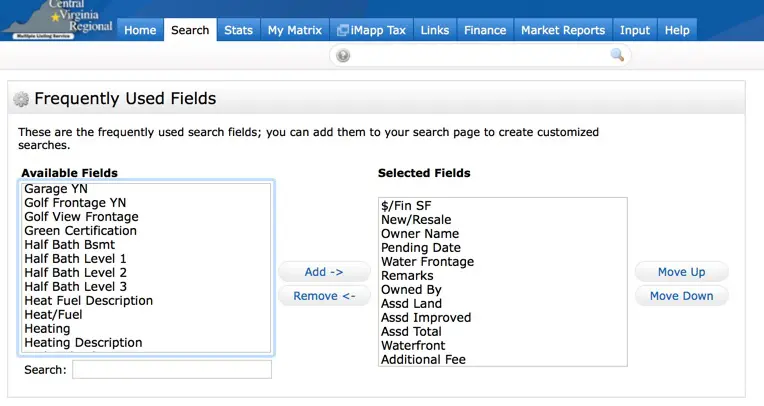
There are literally hundreds of search fields that are available in MLS that are not available for search on the public facing search sites. In MLS, a seasoned agent can execute searches on different fields to really begin to find hidden value. One of my personal favorites is to query the remarks that only agents see (not shown to the public) to look for cues about seller motivation. Another favorite is to use the tax records (as discussed earlier) to query minimum lot dimensions to show possible candidates for splitting off an extra lot.
So while the public does have access to far more information than in the past, the best tools for query and analysis are still only available to the agent community and their clients.
Conclusion
Hopefully, if you made it this far, you have a far better understanding of all of your options for search.
As we talked about earlier, the portals, while incredible feats of technological achievement, are not without their shortcomings and understanding not only what information they contain, but where they get and what they do with it, is critical for the best outcome. The differences are subtle but not without importance and understanding what each does well means a far more pleasant home search experience.
Listen, Realtors want to jump up and down and complain loudly about the portals, but it does no good. At the end of the day, educating our clients about what search options exist and what each form of search does well is the best option. When an informed public understands the tools available, the best results will occur more times than not.
Happy searching!
